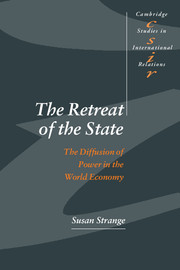Book contents
4 - Politics and production
from Part I - Theoretical foundations
Published online by Cambridge University Press: 07 October 2009
Summary
If there is one change, above all others, which has affected politics at the highest inter-state level and, at the other extreme, the life chances of individuals throughout the world, it is change in the production structure of the world economy. That is to say, in what goods and services are produced, how, where and by whom. This change is not so much the emergence of the ‘multinationals’ so-called – they have been around for a long time; it has been the change from production mostly designed and destined for one local or national market, to production mostly designed and destined for a world market, or at least for several national markets. In short, it is not the enterprises that are multinational. (The word was always a misnomer, anyway.) It is the market. Production for the larger world market has transformed innumerable national or local enterprises into transnational corporations (TNCs).
A major hypothesis of this book is that the shift from state to markets has actually made political players of the TNCs. The argument is not that they influence the foreign policies of states or are, in any general and important sense, the ‘powers behind the throne’, even though in special circumstances they may be so. Rather, it is that they themselves are political institutions, having political relations with civil society. These political relations are even more important than their political involvement with other firms or with specific governments.
- Type
- Chapter
- Information
- The Retreat of the StateThe Diffusion of Power in the World Economy, pp. 44 - 65Publisher: Cambridge University PressPrint publication year: 1996

